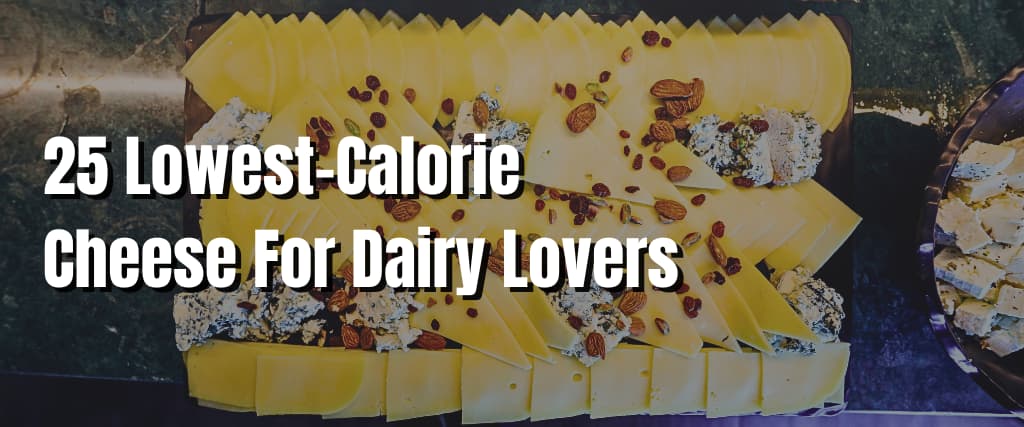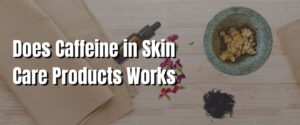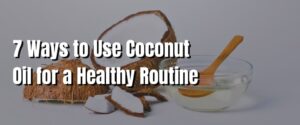Cheese is a staple in Australian diets. Australia ranks second to France in annual cheese consumption, at 13.4 kg per person.
The controversy surrounding cheese’s fat content is partly to blame for its negative reputation. However, it is no longer believed that eating fat causes weight gain. Now, let’s put that behind us.
You might not want to indulge in cheese if you’re trying to control your weight. But eating the right kinds of cheese can aid in weight loss and improve your health.
Is it true that cheese is unhealthy?
Those who can get cheese of good quality may reap several health benefits. It contains a lot of healthy fats, is high in protein, and contains only a few carbs.
In addition to its high calcium content, cheese provides a good source of other vitamins and minerals, including selenium, zinc, vitamin K, B vitamins and phosphorus. Many kinds are also an excellent way to get the bacteria naturally occurring in your digestive tract.
Cheese consumption has been associated with positive health outcomes, including but not limited to improved cholesterol and bone health, a manageable body mass index and lower blood pressure.
However, as a medical nutritionist, I encounter many patients who have problems digesting dairy products like cheese. This may occur for various reasons, such as sensitivity to dairy products or lactose intolerance.
Others whose symptoms or health conditions may be exacerbated by dairy products or by an increase in inflammation have also received my recommendation to cut down on their intake of dairy products.
The health benefits of cheese go far beyond calorie count, as there is a wide range in cheese quality. Certain cheeses are manufactured with few ingredients, aged the old-fashioned way, or left natural.
Many others undergo extensive processing with various additives to increase shelf life, alter the texture, and boost flavour. You can rule out any positive health effects from the second group.
How much cheese you eat and what you eat with both have a role in determining whether cheese benefits you.
Nachos, burgers, pizza and dips are unfavourable foods that combine poorly with cheese. And don’t forget the beers and wine! It’s also simple to overindulge, especially when presented with a spread of tempting cheeses.
Low-Calorie Cheeses for the Cheese Lovers
If you are a cheese fan, you’ll be pleased to know that many varieties may be included in a healthy diet, regardless of whether you’re watching your calorie intake.
1. Cottage Cheese

Cottage cheese is a common staple for weight loss and muscle-building diets because it is packed with protein and has the fewest calories of any cheese.
It’s a fantastic nutritional boon, including such essentials as B vitamins, selenium, phosphorus and calcium.
The nutritional value of cottage cheese varies widely. Some may contain artificial sweeteners, preservatives, salt or thickeners. Certain cottage cheese brands primarily use low-fat milk, while others use whole milk.
You may want to watch your sodium intake if you eat a lot of cottage cheese. It’s best to read the label and decide which cheese type and brand meets your needs.
2. Ricotta Cheese
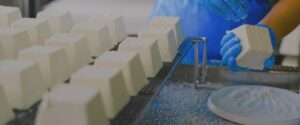
At about 158 cal for every 100 grams, ricotta cheese is among the cheeses with the fewest total calories. The protein-rich whey and curd from cow’s milk are the main ingredients. You can also use goat or sheep’s milk to make ricotta.
Ricotta contains calcium and healthy fats, and anti-inflammatory minerals like selenium. It additionally has a low blood sugar level.
Use ricotta in both sweet and savoury applications. You can use it to make scrambled eggs or an omelette. Make a smooth spread over toast or use it as a dip for crudités.
Ricotta and roasted peaches make a delicious dessert. Or try a combination of fresh berries topped with a sprinkling of seeds and nuts.
3. Fetta Cheese
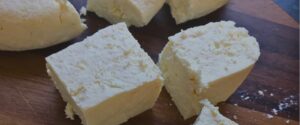
Low-fat fetta is similar to other creamy, soft cheeses. For people who have trouble digesting cow’s milk, fetta prepared from goat’s or sheep’s milk is a viable alternative (although it still contains lactose).
Although it has a reputation as a lower-fat cheese, fetta contains heart- and weight-healthy fatty acids. It’s no surprise that fetta cheese is a staple of Mediterranean cuisine.
Since salt is an ingredient used to create fetta, certain brands may contain a lot of sodium. If you’re wondering whether or not to eat fetta, you should check the ingredients on the labels.
4. Mozzarella Cheese

Mozzarella is minimal in calories and contains B vitamins, fat, calcium, selenium, phosphorous and protein, just as the aforementioned soft cheeses. Although it still has sodium, it has less than most other types of cheese.
You can buy mozzarella, either shredded or whole. The shredded types will always have anti-caking additives or preservatives to prevent the cheese shreds from clumping together or sticking together. Thus, I always advise going with the entire form.
You can include this cheese in a balanced eating diet. The mozzarella itself isn’t particularly significant; what you decide to do with it is.
5. Gouda

Gouda is an aged cow’s milk cheese with various textures and flavours.
Gouda, like other cheeses, is an excellent protein and calcium source. It also contains high amounts of salt, zinc, and vitamins B5, B6 and B12.
Likewise, different brands will have different levels of ingredients and nutrients, with some even including artificial colours and flavours.
Since most contain additives, I advise folks to avoid pre-sliced or pre-shredded cheeses. In this scenario, you may discover options like sliced gouda cheeses from Woolworths without artificial ingredients.
It’s important to remember that gouda is high in calories, and overeating is easy. If limiting the calories you consume is a priority, portion your food beforehand and put the remaining block out of sight and mind.
6. Parmesan Cheese

The flavour and health benefits of Parmesan cheese, sometimes called Parmigiano Reggiano, are substantial.
Although it has a high protein and fat content, which makes it more calorically dense than others, it does have some advantages.
The fat consists of digestible, energy-rich medium and short-chained fatty acids. Shavings of Parmesan cheese on salad greens or a dusting of the cheese over pasta are two common examples of its use in miniature.
Parmesan cheese is lactose-free and hence the best option for lactose-intolerant people. With parmesan cheese, the discomfort of abdominal bloating, gas, and irregular bowel movements ends forever.
7. Blue Cheese

Blue cheese is among the most disputed cheeses available. Mould cultures are just some of the things that can put folks off; the strong aroma and even stronger flavour also don’t help.
Blue cheese is among the healthiest options on our top 10 cheeses, with the lowest calorie count. In addition to being rich in calcium, phosphorus, zinc and vitamin A, it also contains a lot of healthy fats. Among cheeses, blue cheese has a rather high salt content.
Blue cheeses like gorgonzola, Roquefort and Danish blue are widely available. There’s a low-fat version, too. Depending on your preference, the nutritional value of the blue cheese will shift.
Many brands have few ingredients and are thickener- and preservative-free, which is good news.
8. Swiss Cheese

Swiss cheese, a staple in animated cheese, is derived from cow’s milk and has a moderate flavour and low-calorie count. Gas bubbles created by the lactic bacteria are the reason behind the holey appearance.
Swiss cheese is a fantastic ingredient because it typically contains natural and simple ingredients. This also holds for pre-cut varieties of Swiss cheese.
Swiss cheese has high protein and low sodium content, helping you feel full for longer.
9. Cheddar Cheese
The flavour and adaptability of cheddar cheese make it a fan favourite. However, it has more fat, sodium and more calories than many types of cheese.
Those on a ketogenic or low-carbohydrate diet may find it particularly pleasant due to the higher calorie and fat content. The decreased lactose level of aged cheeses like cheddar can make them simpler to digest.
The quality of Cheddar cheese varies. Avoid pre-shredded or pre-sliced cheddar since it likely contains additives like salt and anti-caking agents. Due to many artificial additives, you should avoid string cheddar sticks and skip the singles.
10. Feta
Feta is a white, salty cheese with a soft texture that originated in Greece. Common ingredients include goat’s or sheep’s milk. Feta made from sheep’s milk is acidic and harsh, while feta made from goat’s milk is more subtle.
Packaging feta in brine to prolong shelf life may contain a lot of sodium. However, it has fewer calories than other types of cheese.
Like other full-fat dairy products, feta contains conjugated linoleic acid (CLA), linked to various health advantages, including weight loss and enhanced body composition.
Three months of taking 3 grams of CLA supplements daily resulted in a significant reduction in obese people’s body mass index compared to those using a placebo.
Getting more CLA from foods such as feta may help you look better in your clothes.
However, studies are scant and have concentrated mainly on supplements of CLA. Consequently, more research into the effects of CLA-containing foods like feta is required.
Enjoy feta cheese by scattering it on salads, combining it with your eggs, or whisking it to make a dip to complement your raw veggies to increase your dairy intake.
Greek feta cheese has more salt than other cheeses but fewer calories. It also has conjugated linoleic acid (CLA), a fatty acid associated with better body composition.
11. Goat Cheese
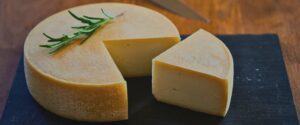
Chevre, or goat cheese, is a mild, creamy cheese that gets its tang from goat’s milk.
Its shapes and textures include crumbles, spreadable logs, and “Brie” imitations.
In addition, there are more MCFAs in goat’s milk than in cow’s milk. Rapid absorption and decreased potential for fat storage characterise these fats.
In addition, some people have an easier time digesting goat cheese than cow’s milk cheese. Possible explanations include goat’s milk’s lower lactose content and unique proteins than cow’s milk.
Specifically, unlike the A1 casein in dairy milk, the A2 casein found in goat cheese might be non-inflammatory and less likely to trigger digestive discomfort.
Goat cheese, when crumbled, goes well with greens, eggs and pizza. In addition, whipping goat cheese is a fantastic condiment for fresh vegetables and fruits.
Compared to cow’s milk, goat cheese has a lower lactose content and may have more easily digestible proteins.
12. Neuchâtel Cheese

Neufchâtel cheese is a great low-fat substitute for cream cheese if you want a spreadable, soft type of cheese. This cheese has less saturated fat than conventional cream cheese (3.6 grams per ounce instead of 5.1).
Neufchâtel cheese is a suitable substitute for cream cheese in many dishes. Try the Pimiento Cheese or the Cheesy Vegetable Bake.
13. Cottage Cheese (2% Milkfat)
Fruit salads, plates of pasta, and baked potatoes benefit significantly from including cottage cheese. Cheese lovers trying to reduce their saturated fat intake may also appreciate this.
The United States Department of Agriculture reports that this cheese has a little over 1g of saturated fat for every serving (approximately 3.5 ounces).
Try it in some delicious Cottage Cheese and Raspberry Honey or Quinoa Lasagna.
14. Zero Fat Feta Cheese
First on this list of low-calorie cheeses is fat-free feta. When baked or whipped, Greek feta cheese makes a stunning centrepiece for a charcuterie platter and is popular for sprinkling over roasted vegetables, soups and salads.
Feta cheese is fat-free and has only 15 cal/ounce, making it the lowest-calorie dairy cheese available. The Greek chicken and pasta bowl is my go-to dish to top with feta cheese.
15. Zero Fat Ricotta Cheese
Following that, we have ricotta which is low in fat. This kind of cheese is considered among the healthiest one can consume because of the phosphorous, calcium and selenium it contains. It is also very creamy and rich in nutritious elements.
If you choose the fat-free variety, a serving of ricotta contains only 23 calories, making it among the lowest-calorie cheeses for every ounce.
In addition to being low in calories, it is also high in protein.
This Italian creamy and soft cheese is indispensable in countless recipes, from savoury pasta meals like lasagna to sweet desserts such as ricotta cake and numerous dips.
16. Zero Fat Cream Cheese

Cream cheese is an excellent ingredient on hand for cooking meals, such as my cheese pancakes, and is also the regular spreadable cheese alternative for toast and bagels.
Regarding calories per ounce, zero-fat cream cheese is among the lowest. There are only 30 calories in every ounce!
Blending this fat-free cheese with lower-fat creamy cheese enhances the flavour of both and makes them more palatable. The fat-free variety has fewer calories but lacks the rich richness of regular cream cheese. In my experience, you can maximise your calorie intake by combining the two types.
17. Slices of Fat-Free Swiss Cheese
It’s great in recipes like these stuffed pork chops, but I prefer it just by the slice (is that weird?).
18. Slices of Zero Fat Cheddar Cheese
Finding cheddar cheese that is zero fats can be a challenge, but when I do, it quickly becomes among my favourite low-calorie cheeses.
Cheese that contains nine grams of protein per 40-calorie serving is hard to top. It’s a terrific addition to some protein-rich crackers or rice cakes.
19. Zero Fat Mozzarella Cheese
Shredded mozzarella with zero fats tastes great on salads, pasta dishes, and low-calorie pizza. It’s also good as a snack, which may initially sound strange.
I should also mention that Kraft offers a free-of-fat shredded cheddar option.
20. Jarlsberg Lite Swiss Cheese Slices (6g Protein)
When it comes to low-calorie cheesesteak fries and sandwiches, Swiss cheese is one of my top picks.
I like to prepare a low-calorie sandwich with some air-fried chicken pieces, delicious Swiss cheese, and D’Italiano low-calorie white bread. It’s a quick and easy meal with minimal calories but still filling.
21. Miniature Babybel Light Cheese
These little cheese wheels are perfect for snacking because they only have 50 calories per serving. The fact that they come in discrete packages makes it simple to monitor intake. In addition, there is a wide selection of tastes to choose from.
22. Lower-Fat Goat Cheese
Similarly adaptable is goat cheese, commonly referred to as chèvre. It works wonderfully in and on a wide variety of dishes. Each ounce of this cheese has only 50 calories, making it an excellent choice for those on a calorie-restricted diet.
Goat cheese has a rich, complex flavour that is earthy, buttery, and tangy. In my opinion, it is at its tastiest when combined with balsamic vinegar, sliced beets and crushed walnuts.
23. Lower-Fat Labneh Cheese
This cheese, often called yogurt cheese, contains a thick, spreadable consistency and a sour flavour. You can use it instead of cream cheese in any recipe calling for either, as the two are remarkably similar.
Each ounce of labneh contains a maximum of sixty calories and is an excellent source of probiotics for digestive health. You must try it on keto bagels and any other food you normally top with cream cheese.
24. Cabot Lite Cheddar Cheese (50 sharp)
Cabot makes arguably the finest cheese available, and this reduced-fat variety of their sharp cheddar is fantastic. The flavour resembles their standard cheddar cheese, but the calorie count is far lower.
In addition to enjoying it with the healthy crackers I described, it is also delicious when eaten on its own.
25. Zero Fat Cottage Cheese
Finally, free-of-fat cottage cheese rounds off our collection of the greatest lower-calorie cheeses one can eat. This lower-calorie pancake mix benefits greatly from adding this higher-protein cheese, making a tasty foundation for berries and granola.
Since it contains a lot of protein, it’s perfect for eating after your workout because it helps you feel full for longer.
Top 7 Substitutes For Cheese
Without a shadow of a doubt, cheese is among the tastiest meals available. However, many people find it upsets their stomachs despite its delicious taste. Many people have sensitivities to cheese, but that doesn’t mean they must give up flavour altogether.
Fortunately, you can still enjoy cheesy, delicious meals thanks to various fantastic alternatives. Here are seven great substitutes for cheese, whether you are trying to avoid dairy, your stomach can’t handle cheese, or you just ran out of a favourite cheese variety.
Kite Hill
Kite Hill by Ricotta is perfect if you’re lactose intolerant or a vegetarian but still crave cheese’s savoury flavour and creamy consistency. Made using almond milk rather than cow’s milk, this alternative is remarkably close to the real thing.
SweetPotato Sauce
Make a cheese sauce out of sweet potato to use as a place of traditional cheese over nachos, a gratin, or even macaroni and cheese! This delicious dish is courtesy of Chef Chloe.
Cashew Nut Cheese
You can substitute your homemade cheese using raw-soaked cashew nuts and some nutritional yeast. Cheese, when seasoned properly, can serve as a condiment or even a sauce for pasta. There are several cashew cheese recipes available online.
Pesto
If you’re creating a sandwich or pasta, try spreading pesto rather than cheese. Choose standard basil pesto and more daring options like sun-dried kale, almond or tomato.
Cheesy Zucchini
Zucchini is an excellent alternative to cashews for making cheese spread. If you like cheese in thin slices, this is a good choice. Although it does not contain dairy, it is not vegan. Try recipes from online recipes.
Daiya
Daiya cheese is perfect for creating grilled cheese, pizza, sandwiches or nachos because it is pre-shredded and melts like ordinary cheese. You can customise your order by selecting cheese options, including pepper jack, cheddar and mozzarella.
Buttery Tahini Dip
Tahini may stand in for cheese in many dishes, including dips, sandwiches, salads and more. Made from sesame seeds, it’s a fantastic vegan addition to any dish.
When Trying to Cut Back On Saturated Fat, Is Cheese Off-Limits?
Some cheeses, such as blue cheese, Cheddar, and Muenster, have as much as 40 per cent of the American Heart Association’s recommended daily saturated fat intake in just one ounce.
Cheese can be part of a diabetes-friendly or heart-healthy eating plan if consumed in moderation and as part of an otherwise healthy and balanced diet.
Many health-conscious individuals initially considered cheese to be “bad” food. New evidence suggests that cheese’s peptides, calcium and bioactive lipids may benefit cardiovascular health.
Meal research from 2020 reveals that rather than recommending people avoid dairy-fat sources such as cheese, the more acceptable recommendation would be to eat dairy-based meals in moderation as part of a nutritious diet.
Remember that many cheeses’ salt content is high, regardless of their saturated fat content. People with blood pressure, kidney diseases, or diabetes might want to regulate their sodium intake to prevent further health complications.
Conclusion
Quality cheeses may constitute your healthy diet even if you can’t tolerate dairy. There is nothing like “low calorie” cheese because of its inherent fat and protein content. However, some varieties of cheese can fall within your calorie limits.
The trick is picking a high-quality item with a low level of processing. Keep an eye on sodium levels and other artificial substances like flavours, colours, or preservatives.
In addition, think about the other foods you’ll eat with the cheese. This primary factor will make you exceed your daily calorie limit.
FAQs
What Kind of Cheese Has Few Calories for Dieting?
Cottage cheese is a popular recommendation for those trying to lose weight because it is rich in protein yet lower in calories. Studies show that consuming high-protein foods such as cottage cheese might help you feel full on fewer calories, aiding in weight loss.
I’m on a diet; which cheeses may I eat?
Fresh cheeses are the best for weight loss. The smooth and velvety cheeses are the fresh ones. Among these are mozzarella, ricotta, mascarpone, cottage cheese, and cream cheese.
You might associate them with the fatty dishes in which they frequently appear, but this isn’t the only means by which you can enjoy them.
Does Feta Cheese Have Lower Calories?
Although high in sodium, feta cheese is low in calories and a good source of several essential nutrients. As a source of saturated fat, it should make up at least 10% of your daily calorie intake.
Should I Replace Cheddar with Halloumi?
The brine employed to preserve halloumi cheese gives it over twice the sodium load of ordinary cheddar cheese, despite having a little less fat content (26%). One of the main problems with halloumi is the temptation to overeat it because it is so tasty.
Can You Recommend a Low-Carb Cheese?
Goat cheese is an excellent option if you’re on the ketogenic diet. It’s a terrific method for hitting your macros because it has no carbs — According to the USDA, there are 103 calories, 8 grams of fat, zero carbohydrates, and six grams of protein in a single ounce of goat cheese.

